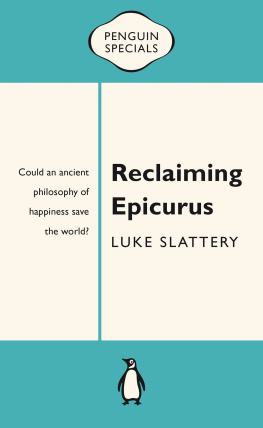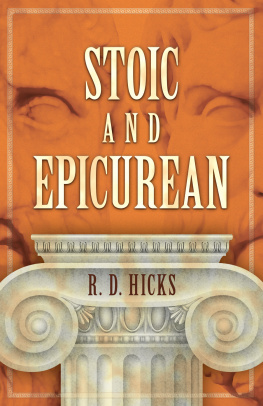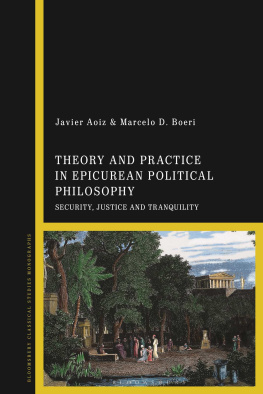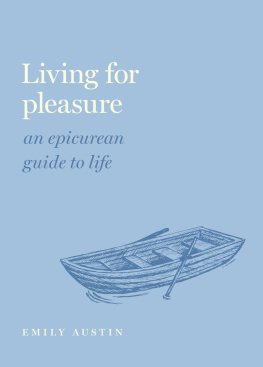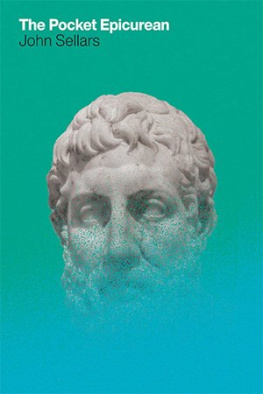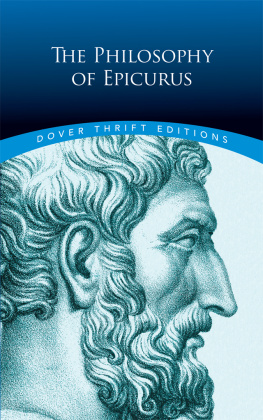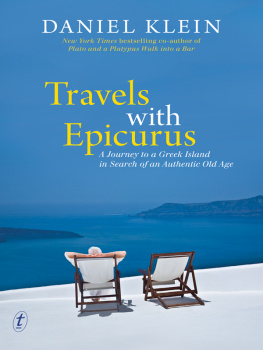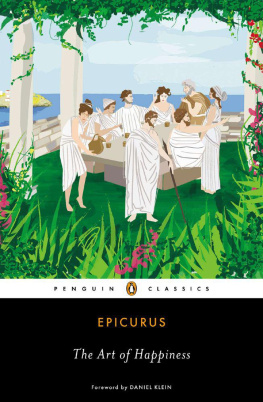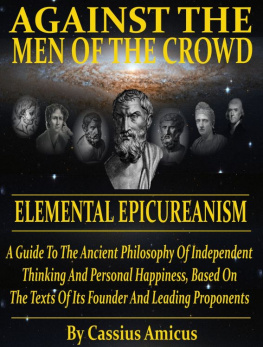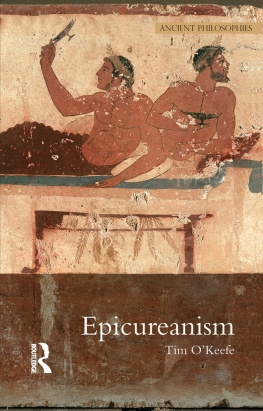Luke Slattery is a Sydney-based journalist, editor and novice Epicurean. He has spent most of his career in newspapers writing about the world of ideas for a wide audience. He has served as higher education editor at The Australian , The Age and the Financial Review , and has been the recipient of the Higher Education Journalist of the Year Award, the European Union journalist award, and the Australia Councils Keesing writing fellowship in Paris. His journalism and writing have been published in the main Australian metropolitan newspapers and internationally at The International Herald Tribune , the London Spectator , The Scotsman , and the US Chronicle of Higher Education ; a number of his articles have been republished online at the Arts & Letters Daily web portal. Slattery is the author of two books: Crisis in the Clever Country: Why Our Universities are Failing (with Geoffrey Maslen), and Dating Aphrodite: Modern Adventures in the Ancient World . He is an honorary associate of the University of Sydneys department of Classics and Ancient History.
Reclaiming Epicurus
Ancient wisdom that could save the world
All that is very well but let us cultivate our garden
Voltaire
At the dawn of the third century before Christ a philosopher named Epicurus abandoned the city of Athens for a garden outside its walls. A group of friends and followers men and women, free citizens and slaves joined the sage at his semi-rural retreat. Their guiding principle was the pursuit of pleasure, which they understood not so much as the fulfilment of desire as its rational mastery. The richest pleasure of all, Epicurus believed, was freedom from suffering. By pleasure, he insisted, we mean the absence of pain in the body and trouble in the soul. As some of the few surviving writings by Epicurus explain, his band of communards aimed to live frugally and at peace amid natures wealth. They were green when the world was young.
The Epicurean ideal was distilled in antiquity to a quatrain of spare yet beautiful phrases:
Nothing to fear in God;
Nothing to feel in Death;
Good can be attained;
Evil can be endured.
This tetrapharmakos, or fourfold remedy, implores us to be happy in this moment; to stop postponing our joy; to seize the day. Its preservation in the writings of a first-century BC Epicurean philosopher named Philodemus, who presided over a vast Epicurean library at Roman Herculaneum (and wrote erotic light verse in his spare time), suggests it remained a vital ingredient of the Epicurean cure long after the masters death. But its combination of sunny optimism and spiritual bravura serves to obscure an important ingredient of the creed: its edgy radicalism.
The Epicurean message, as the noted French scholar of late antique philosophy Pierre Hadot succinctly explains, is that we must learn to be content with what satisfies fundamental needs, while renouncing what is superfluous. A simple formula, but one that cannot but imply a radical upheaval of our lives. If translated into contemporary terms, it would compel us to temper our mania for consumption of more cars, more clothes, more gadgets and more stuff; if practised en masse, it would remake our world in the name not so much of economic and social revolution as personal happiness.
Epicureanism was criticised in antiquity for its tone of social disengagement. There is certainly a point to this rebuke, for as an art of living it values retreat, security and relaxation over power, wealth and acquisition. Its emblem is the garden. Its original social model is the small detached community. Its aim and goal is contentment. But a brief sketch of its social and historical milieu will help place the Epicurean dream of the good life in context.
The Hellenistic age commonly dated from the death of Alexander the Great in 323 BC to the consolidation of Rome after the battle of Actium in 31 BC fathered the three great philosophical schools of Epicureanism, Stoicism and Scepticism. These therapeutic philosophies, which took their place alongside the Platonic Academy and the Lyceum of Aristotle, arose in response to a world that had been remade by powerful and largely destructive forces. Alexander the great of Macedon had forged a vast Greek-speaking empire that quickly, upon his death, broke into a trio of rival kingdoms centred on Pella in Macedonia, Alexandria in Egypt and Antioch in Syria. These were ruled by former generals of the god-king who amassed great personal fortunes while building their own luxuriant dynasties The once proud Greek city states, particularly Athens, had been the incubators for democracy, philosophy, drama, sculpture, architecture, and lyric poetry. But they had lost their political independence after the Macedonian conquests, and in the age that followed they were to lose much of their confidence and creative zest.
This has traditionally been characterised as an anxious and insecure age; an age of failure failure of nerve. The philosopher Bertrand Russell neatly captures the emotional temper of the time: There seemed to be nothing rational in the ordering of human affairs. Those who obstinately insisted upon finding rationality somewhere withdrew into themselves. Epicureanism is not the only Hellenistic school tinged by this mood of retreat. But whereas the Stoic withdraws into a fortified self or inner citadel, and the Sceptic retreats from all possibility of knowledge, the Epicurean picks up his bags and quits the city, leaving the agora behind. And yet Epicureanism, by another view, is the most intensely political of the three Hellenistic schools. Its full political implications have, admittedly, taken more than twenty-three centuries to unfold. If economic and environmental sustainability is understood as the burning political issue of our time then Epicureanism, as a philosophy of living in harmony with nature, addresses the most pressing concerns of the twenty-first century with compelling force.
I find it astonishing that a philosophy of such deep antiquity, predating Christianity by three centuries, speaks with such prescience to one of our greatest social challenges. In their mid 2012 book How Much is Enough? Money and the Good Life , British economists Robert and Edward Skidelsky argue against a disease by the name insatiability, which they define as that psychological disposition that prevents us, as individuals and as societies, from saying enough is enough. Epicurus was the first philosopher in the Western tradition to diagnose the disease of insatiability, and the first to propose a cure.
Epicurus was an Athenian citizen, born on the island of Samos, in 341 BC. He died in 271 in his early seventies, leaving his garden to his disciples. After drafting a will and testament he wrote to a friend describing his last day as blissful, setting his present sufferings against the gladness of mind induced by memories of our past conversations. It is likely that the circulation of this document played a vital role in the creeds popularity, for in the view of the Roman philosopher-statesman Seneca, writing in the first century AD, the philosophy of Epicurus was only truly discovered after his death and did he not then acquire a shining reputation? It is said that Epicurus started as a schoolmaster and turned to philosophy after reading the works of the fifth century naturalist philosopher Democritus, from whom he drew some ideas about the nature of matter that foreshadowed modern physics. It is the philosophy of the Gardens less-is-more ethical message, however, that speaks to our current concerns about economic and environmental sustainability.
We inhabit an increasingly populous and energy-hungry world, and depend for our welfare on an economic system whose health is predicated on relentless growth (an economic recession is, by definition, a sustained period of contraction). And yet the gains of economic growth are, broadly speaking, ecological losses. To take just one example: the greenhouse gases released by burning coal, gas and oil essential fuels for economic activity are the prime source of steadily rising atmospheric carbon dioxide. As economic activity increases, the pace of global warming quickens. Our conversation about the environment is, of necessity, a conversation about the economy; and both conversations are sharpened by an awareness of the Epicurean ideal of sufficiency in which happiness is untethered from the desire for material acquisitions that fuel economic expansion. The true Epicurean cultivates the capacity to take pleasure in simple things, while those around him chase pleasure in more things. As a personal ethic it suggests a way, by limiting wants, to restructure the economy; and by cooling the economy it offers some hope of cooling the Earth.

